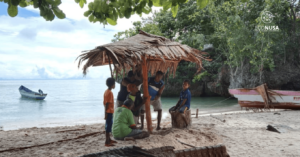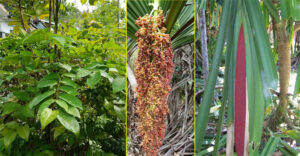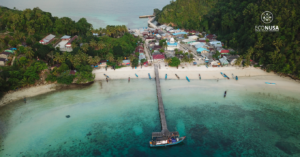
Ecotourism changed the lives of the people of Kampung Malagufuk, Makbon District, Sorong Regency, West Papua Province. The Malagufuk people no longer rely on agricultural sales. Because so far they have to walk as far as 3 kilometers to be able to sell agricultural products. Now they do not need to sell away their agricultural products. They offered it to tour guests who visited Malagufuk for bird watching.
Malagufuk village was formed in November 2014 as a result of the expansion of Malumkarta Village, Sorong Regency. In its relatively young age, ecotourism helps support the community while protecting Klasow’s natural forests. Dominggus Kalami, who is familiarly called Absalom, a descendant of the Moi tribe, is one of the witnesses of how ecotourism impacts the community and efforts to protect the forest.
Absalom used to work as a farmer before the community learned about the potential for ecotourism in Malagufuk Village. Everyday is filled with cultivating land and vegetables to be sold to the market. Absalom never thought to earn money by cutting wood or hunting wild animals that live in the forest. His parents always instilled the importance of the Klasow forest for the Moi Tribe.
“From ancestors down to my parents, they advised that the forest was very useful. We don’t even think about catching birds and then selling them on the market, “Absalom said.
Absalom never crossed his mind to develop ecotourism. Until one day in the first year of the village, a local tour guide named Charles Roring came to Malagufuk. Charles saw the potential of ecotourism after he asked for permission to enter the Klasow forest at the end of November 2014. After leaving the forest, Charles had a message that the community continue to protect the forest.

“He entered (the forest) and said that this location was very good to be used as ecotourism. The forest is good, can promise for tomorrow and all guests will definitely come here, “said Absalom tells Charles.
Introduction to Ecotourism
Charles is a long time person in the world of tourism. He currently serves as an administrator of the West Papua Provincial Guides Association (HPI) Regional Leadership Council. Charles actively promotes Tanah Papua tourism on social media and writes regional reviews on a number of blogs.
When they visited Malagufuk, West Papua HPI was not functioning properly. He departed on a personal initiative with Nico Nauw who currently serves as DPC HPI Tambrauw, accompanied by two Malagufuk youths, Kostan Magablo and Luxen Paa, when entering the Klasow forest.
Charles is from Minahasa, North Sulawesi, from his parents. Born and raised in the Land of Papua grew his love for nature. Together with his friends, since childhood he has cleaved the forest in Manokwari and dived on the beach. Charles believes that nature is a supporter of the lives of the people of Tanah Papua. Forests are a source of food, medicine, firewood and clean air. This also made Charles choose to go into the world of ecotourism.
After parting with Absalom, Charles wrote a review of the Malagufuk Village ecotourism potential to convince guests to visit. The article titled “Birdwatching Tourism in Sorong” was published on August 22, 2016. In this article Charles explained the components of tourism such as attractions, accommodation, accessibility, and what activities can be enjoyed by travelers.
“I wrote hundreds of articles about travel on the internet. From there many people read it, then interested in visiting West Papua. The first guest to come to Malagufuk was from Germany, “Charles said.
Klasow Forest is quite far from Sorong City. Not just any vehicle is able to pass through unfriendly roads. Only cars with 4WD dual wheels like HiLux, Fortuner and Strada are strong. The travel time of two hours paid off with the high biodiversity that inhabited Klasow. There is a Small Yellow Bird of Paradise (Lesser bird-of-paradise), Magnificent Riflebird (Ptiloris magnificus), Golden Myna (Mino anais), Rufous Bellied Kookaburra (Dacelo gaudichaud), Mustache Treeswift (Hemiprocne mystacea), Papuan Hornbill (Rhytic plicatus) and many Rheros plicatus) other bird species. There is also a Bird’s Wing (Ornitopthera priamus), a butterfly that has a wing span like a bird’s wing.
During the first encounter Absalom doubted Charles. He did not not know Charles’s track record in the world of tourism. “So from there I think whether (ecotourism) is true or not,” recalled Absalom.
Some time later Charles and other Malagufuk youth worked together to build ecotourism. Charles taught the Malagufuk youth how to identify birds in the Klasow forest and distribute binocular binoculars, books and laser pointers.
“I also ask guests to leave the book Birds of New Guinea in the village so that residents can learn. After that other village youths also learned birding including Absalom, Yance, Obaja, and others. Young children also learn birding like Kelvin, Andreas and Roy, “said Charles.
Develop Malagufuk ecotourism
Since then, Absalom has been determined to develop birdwatching ecotourism in Malagufuk Village. One of Absalom’s challenges in managing ecotourism is communication with guests. At that time he was not familiar with foreign languages. To address this challenge, Absalom has its own tips. He made small notes containing words that were often spoken in English. Before picking up guests at the airport, Absalom had memorized a number of sentences in English. Fortunately Charles helped give guests an understanding of this.
“The word sorry is always used by the brothers and I in the village to excuse me. ‘Oh mister, are you looking for bird-of-paradise? You see? ‘We use hand codes. Anyway, it can make guests somewhat understand what we mean, “said Absalom.
Actually there is no superiority of Klasow forest compared to other forests in Papua. There, primary forests become a habitat for so many species with high biodiversity levels. They strongly agree on the philosophy of the ancestors so as not to damage the forest. In addition, the Malagufuk community believes that the travelers are their relatives who have just arrived. According to Absalom, that friendliness makes visiting guests never leave complaints in the guest book.
In the first year of ecotourism growing in Malagufuk, Absalom and his colleagues received 150 guests. The following year the visit rate rose to 200 people, and 250 people until the end of 2019. In 2020 only 10 guests visited. According to Absalom, 50 percent of tourists come from other countries such as the Netherlands, Britain, India, Japan, Korea, Germany, Brazil, and Italy.

The life of the Malagufuk people is slowly changing. The community reduced the sale of agricultural products to the market. They process their own agricultural products to be served to tourists. According to Absalom, in one visit, the community received an income of around Rp. 7-8 million. This income is shared with all those who play a role, from guides, guides and chefs. Malagufuk village now has three homestays for guests to enjoy. Absalom is the owner and manager of Homestay Israel. This name is taken from the name of his son.
“From the profit we built a church, bought a water tank, built four toilet units. Their children can go to school. Children do not ask for transportation costs to parents. Because they also work as tour guides. The best impression we have seen is that to this day the visitors have never left garbage in the village. That is the best impression for society, “Absalom said.
For Absalom, the forest is a mother who has always provided livelihood from generation to generation. He is thankful that the Klasow forest is still maintained today. According to Absalom, ecotourism is one of the causes of the Klasow forest and the ecosystem in it is still maintained. On the other hand, people get income to continue their livelihoods.
“It turns out that ecotourism is good. Our forest is well preserved. The ecosystem is not destroyed, habitats are maintained, and produce for the community. When the forest runs out we are confused about where to go. I taught my family how to grow crops well so that the forest would not be destroyed. We see other forest friends are gone. “They just want to take firewood hard, they don’t want water buckets,” Absalom said.
Absalom hopes that ecotourism continues to exist because with ecotourism the community is able to defend its rights and territories. He believes that ecotourism can control the Klasow forest and all the forests in Indonesia.
International Forest Day on March 21 has just been commemorated with the theme “Forests and Biodiversity”. Coinciding with the warning, the life story of the Malagufuk Village community and various other places became a concrete step. Everyone can learn and understand how ecotourism harmonizes forests and their biodiversity, while still providing a livelihood for the surrounding community.
Editor: Leo Wahyudi







